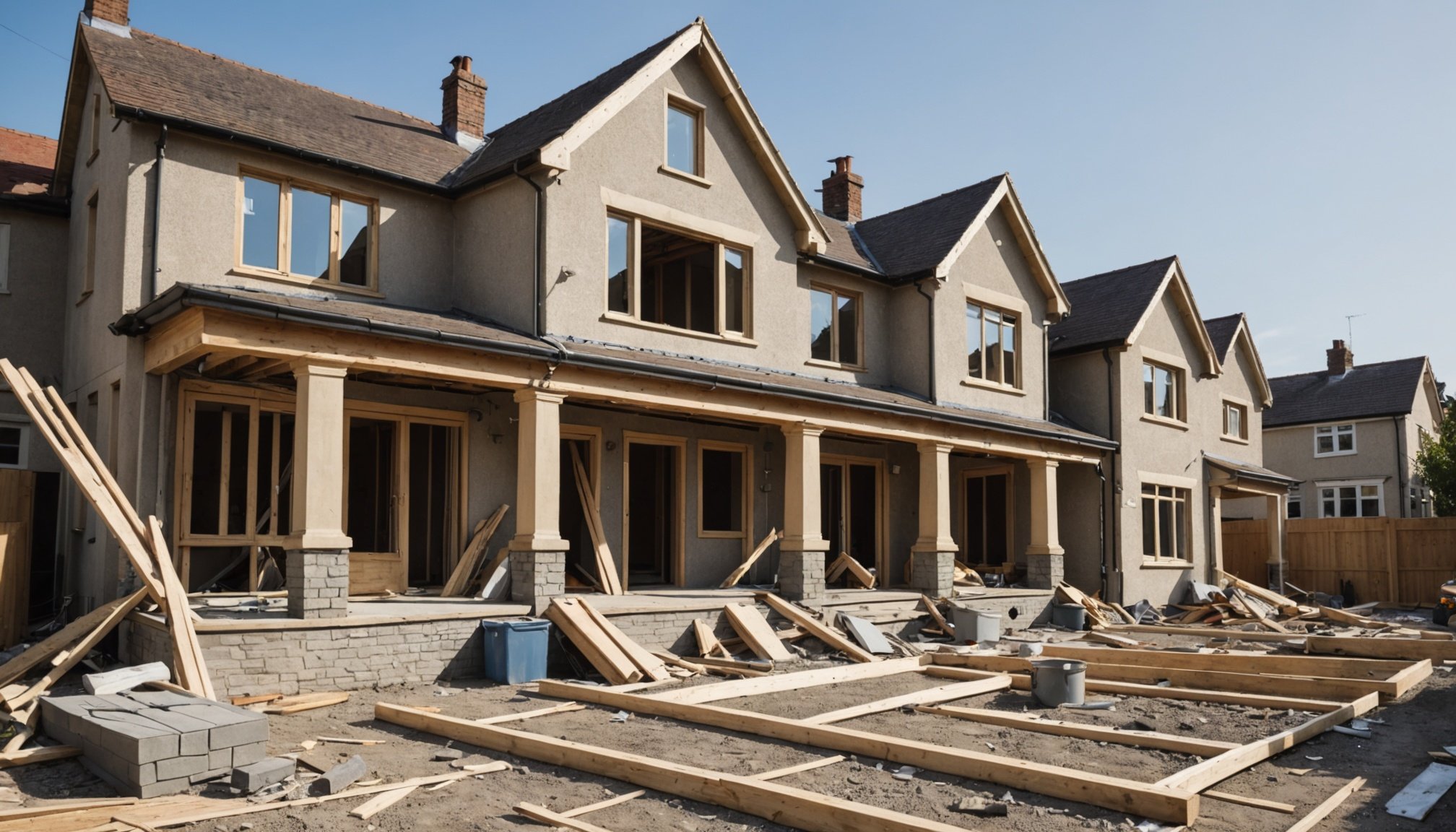Overview of Essential Insurance Policies for Home Renovation Businesses
Home renovation businesses in the UK can face unique challenges, making essential insurance policies a necessity. Proper coverage is key to safeguarding against potential risks and ensuring smooth operations. It also enhances credibility, building trust with clients who value professionalism.
Key types of home renovation coverage include public liability insurance, employer’s liability insurance, and tool insurance. Each serves a distinct purpose:
Additional reading : Mastering Maritime Regulations: The Ultimate Shipbuilder’s Guide to UK and Global Laws
- Public liability insurance protects against claims of property damage or injury caused by the business’s activities.
- Employer’s liability insurance, legally required in the UK, covers employee-related claims, ensuring worker protection and compliance with regulations.
- Tool insurance safeguards valuable assets like tools and equipment, essential for daily operations.
These UK business insurance policies mitigate financial risks, enabling business owners to focus on their core services. In addition to these covers, having comprehensive insurance demonstrates to clients that the business is prepared for potential challenges, which is critical for attracting and maintaining a loyal customer base.
Selecting appropriate insurance requires understanding business-specific needs and potential risks, ensuring that coverage gaps do not jeopardise operations or relationships with clientele.
Also to read : Mastering UK Telemedicine Laws: The Definitive Guide for Digital Health Firms to Ensure Full Compliance
Public Liability Insurance
In the home renovation sector, public liability insurance is a crucial component of contractor insurance. It provides essential risk management, protecting businesses from financial ruin in case of an accident. For instance, if a passerby trips over tools left on-site and sustains injuries, public liability coverage can handle the ensuing claims and medical expenses. This insurance ensures that such unforeseen incidents don’t drain a renovation business’s financial resources.
To select the right public liability insurance, it’s crucial to evaluate the level of coverage required. Consider factors like the size and scope of the projects undertaken. The busier and more complex the projects, the more comprehensive the coverage should be. Entrepreneurs should not solely focus on cost but also understand the terms and limits of their insurance policies to be effectively protected.
Different businesses have varying risks, so tailor the coverage to the specific needs of your operations. Public liability insurance is more than a necessity; it’s a strategic tool in fortifying the longevity and success of your renovation business while maintaining your professional reputation.
Employer’s Liability Insurance
Employer’s liability insurance is a legal requirement in the UK, safeguarding home renovation businesses from claims related to employee injuries or illnesses sustained while working. This insurance not only complies with the law but also demonstrates a commitment to employee protection by covering potential legal and compensation expenses.
In the renovation sector, accidents can happen despite strict safety protocols. For instance, a construction worker might suffer an injury on-site due to unforeseen hazards. In such cases, employer’s liability insurance provides financial security to address claims and ensure that the business can continue to function without significant disruptions.
When determining coverage limits, assess the workforce size and the nature of the work undertaken. High-risk activities may necessitate higher coverage limits to protect against more substantial claims. Additionally, understanding the specific risk factors involved in your operations can guide you in choosing the most suitable insurance policy.
Comprehensive employer’s liability insurance not only ensures compliance with UK laws but also fortifies your business’s stability and enhances its reputation by fostering a safe, secure working environment for employees.
Tool and Equipment Insurance
For home renovation businesses, tool insurance is vital to maintain seamless operations. This coverage provides critical equipment protection by insuring tools and machinery against theft, loss, or damage. Given the investment in high-quality equipment, ensuring these assets are covered is fundamental for effective asset management.
When considering coverage options, it’s essential to understand the difference between replacement cost and actual cash value policies. Replacement cost insurance reimburses the expense of buying new, similar equipment, ensuring you can resume work without financial strain. In contrast, actual cash value policies take depreciation into account, potentially leading to lower payouts.
To select the best coverage, assess the types of tools you use and their risk exposure. Consider policies that offer comprehensive protection, covering a range of scenarios such as accidental damage and natural disasters. Evaluate multiple insurance providers to find plans that align with your business needs.
Investing in robust tool insurance not only safeguards your valuable equipment but also reinforces your business’s capability to deliver consistent and reliable services, ultimately building trust with clients and enhancing your professional reputation.
Professional Indemnity Insurance
In the realm of home renovation, professional indemnity insurance is indispensable, shielding contractors against legal claims due to design errors or project mismanagement. This coverage is crucial as it addresses situations where clients allege that a contractor’s advice or work has caused financial loss. For example, a miscalculation in design plans leading to structural issues can result in hefty legal fees and compensation claims.
Professional indemnity insurance ensures these risks are managed, protecting both financial assets and professional reputation. To determine the appropriate coverage, consider the complexity of projects and the scope of services offered. The more involved and varied the services, the greater the need for extensive coverage. Contractors must evaluate potential risks specific to their operations, ensuring their policy adequately covers possible legal challenges and liabilities.
Ultimately, investing in professional indemnity insurance can help build trust and credibility with clients, demonstrating a commitment to accountability and professionalism. Understanding the unique demands of your projects and tailoring coverage to meet these needs ensures long-term success in a competitive market.
Legal Requirements and Industry Standards
Understanding legal requirements and business compliance is crucial for home renovation professionals in the UK. Insurance policies aren’t just about protection; they are about fulfilling industry guidelines that safeguard the business and its clients.
The UK mandates several insurance forms, such as employer’s liability insurance, to ensure both business compliance and employee safety. Failing to adhere to these requirements could result in severe penalties or costly legal actions. Keeping abreast of such stipulations helps businesses avoid unnecessary penalties.
Staying updated with legislation and insurance standards is necessary. Legislative changes can occur, impacting the insurance landscape. Businesses should establish regular systems to track these modifications, perhaps by subscribing to industry bulletins or consulting with legal professionals regularly.
Neglecting compliance not only affects the legal standing but also harms a business’s reputation. Clients often look for contractors who demonstrate adherence to industry standards, emphasizing professionalism and reliability. By aligning with these industry guidelines, businesses can build credibility and trust with clients, establishing a strong foundation for long-term success. Regular updates ensure your operations remain compliant amid changing legal landscapes.
Risk Management Strategies
Developing a comprehensive risk management plan is crucial for home renovation businesses to ensure both safety and financial stability. Recognising and addressing potential risks inherent in renovation projects can mitigate financial losses and enhance operational efficiency.
Common risks in the renovation industry include accidental injuries, property damage, and project delays. To prevent these, implementing rigorous safety protocols is essential. Regular safety training and the use of personal protective equipment (PPE) can significantly reduce onsite accidents. Additionally, creating a robust incident reporting system encourages proactive responses to hazards, fostering a culture of continual improvement.
Integrating loss prevention strategies into the business model helps maintain insurance costs by reducing claims. This could involve schedule adjustments to accommodate weather-related disruptions or investing in high-quality tools and equipment to minimise malfunction risks.
Furthermore, establishing a proactive risk management plan not only protects assets but also cultivates client trust, showcasing the business’s commitment to quality and safety. As the industry evolves, staying informed about new regulations and potential risks ensures the business remains competitive and resilient against unforeseen challenges.
Case Studies and Real-World Applications
Exploring case studies reveals the practical benefits of insurance in home renovation, underscoring the importance of understanding real-world insurance needs. In one noteworthy instance, a contractor who maintained adequate coverage successfully navigated a costly liability claim stemming from accidental property damage. This case highlights how proactive insurance management can shield businesses from financial setbacks.
Conversely, businesses lacking proper insurance have faced severe consequences. An oversight in securing adequate public liability insurance resulted in a renovation company incurring substantial out-of-pocket expenses following a workplace accident. These errors serve as cautionary tales, demonstrating the necessity of comprehensive coverage.
For those in the industry, learning from these examples emphasizes the importance of meticulously assessing insurance needs. Ensuring alignment with potential risks specific to renovation projects helps in making informed decisions. Utilizing past business examples to guide insurance strategy ensures that businesses are better prepared for unforeseen events, ultimately safeguarding their financial health and professional credibility.
By drawing lessons from real-world applications, home renovation businesses can craft robust insurance strategies, building a foundation for long-term success and trust with clients.
Selecting the Right Insurer
Choosing the right insurer is crucial for securing comprehensive coverage for home renovation businesses. The selection process involves more than just comparing quotes; it requires evaluating reputation, customer service, and the efficacy of their claims process. A reputable insurer with robust client support can significantly impact your business’s resilience in unforeseen situations.
To ensure your choice aligns with your business needs, begin by obtaining detailed insurance quotes. These should reflect the specific risks associated with your renovation projects. Consider comparing at least three different providers to get a sense of the market landscape and available offerings. Policy comparisons are essential to identify which insurers offer the best coverage scope and value for the premiums paid.
When assessing potential insurers, look for a history of prompt claim settlements and positive customer feedback. This will give confidence in their ability to support your business when needed. Additionally, some insurers offer tailored packages or discounts for bundling multiple policies, which can lead to cost savings. Making informed choices about insurers can protect both your financial interests and your professional reputation.
Tips for Minimizing Insurance Costs
Reducing insurance costs is vital for home renovation businesses seeking financial savings while maintaining necessary protection. Implementing effective strategies can lead to significant premium reduction without compromising coverage quality.
Maintaining an excellent safety record is crucial, as it directly impacts insurance rates. Keeping claims history free of frequent claims signals to insurers that the business practices robust risk management. Regularly updating and enforcing safety protocols ensures a safer working environment and helps lower premiums.
Consider the benefits of bundling multiple policies with a single insurer. This approach often leads to substantial discounts and simplifies policy management. When choosing to bundle, ensure the combined package offers comprehensive coverage that aligns with your business needs.
Insurance providers often offer discounts for businesses that demonstrate proactive loss prevention strategies. Regular training, adherence to industry standards, and implementing loss control measures can contribute to securing better premium rates.
Ultimately, the key to minimizing insurance costs lies in balancing cost-effectiveness with adequate coverage. By leveraging available discounts and maintaining a solid safety and claims record, a home renovation business can reduce expenses while ensuring adequate protection.











